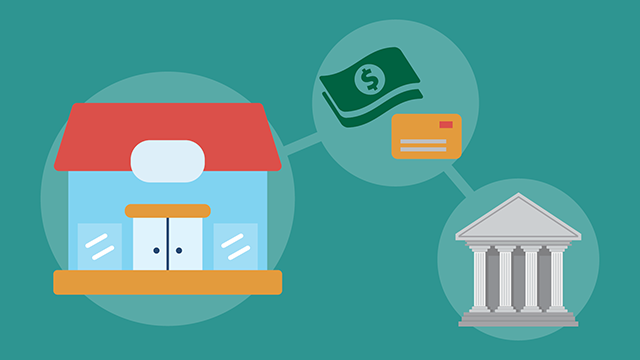Leading Tips for Navigating Pre Approval Student Loans with Self-confidence
Leading Tips for Navigating Pre Approval Student Loans with Self-confidence
Blog Article
The Role of Credit Score Ratings in Getting Small Company Loans for Entrepreneurs
In the competitive landscape of entrepreneurship, safeguarding a bank loan often depends upon the essential factor of credit report. These scores offer as a numeric depiction of a business owner's credit reliability, affecting loan providers' decisions and the terms used. A higher credit scores score can open up doors to favorable loan problems, while a reduced score may offer substantial barriers. Yet, what exactly impacts these scores, and how can entrepreneurs purposefully boost them to boost their chances of safeguarding vital funding? The responses to these questions hold the key to unlocking possible development chances for tiny organizations.
Understanding Credit History
Credit history are crucial mathematical representations of an individual's credit reliability, acting as a critical consider financial decision-making for lending institutions. These scores are stemmed from an extensive evaluation of an individual's credit rating, encompassing facets such as settlement history, credit rating usage, length of credit rating, new credit scores accounts, and sorts of credit scores utilized. Usually varying from 300 to 850, higher scores represent reduced threat to lenders, while lower ratings show higher danger.
The estimation of credit report is executed by credit rating bureaus utilizing proprietary algorithms, with one of the most widely recognized versions being FICO and VantageScore. Each model may consider elements somewhat in different ways, yet they all aim to supply a regular procedure of credit danger. A solid credit report score shows the person's dependability in handling financial obligation, making prompt repayments, and preserving a healthy balance between debt utilized and available credit history.
It is essential for individuals and business proprietors to comprehend their credit report, as these figures can have far-reaching implications past personal money. On a regular basis checking one's credit history report, correcting mistakes, and taking on sound economic behaviors can considerably enhance credit ratings, consequently boosting the person's overall economic account and creditworthiness.
Value for Funding Approval
Recognizing one's credit rating is fundamental, as it plays a substantial duty in the procedure of lending authorization for little companies. Lenders utilize debt scores as a main statistics to evaluate the creditworthiness of applicants.
As little services often need prompt access to funds for growth and sustainability, keeping a durable credit history rating becomes crucial. Hence, understanding and managing one's credit scores score is a critical part of preparing for loan applications and achieving organization success.
Elements Influencing Scores
Several factors add to the resolution of a credit rating score, each playing a crucial role in shaping a person's credit history profile. A high proportion of made use of debt to offered credit history can suggest monetary overextension, detrimentally influencing credit reliability.
Size of credit report also variables into credit rating computations, with a longer credit rating normally seen much more positively. This statistics offers insight right into the individual's lasting economic behavior, offering loan providers a broader viewpoint on their credit report monitoring skills. Additionally, the types of credit scores in operation are thought about, as a mix of credit score accounts, such as rotating bank card and installment car loans, can demonstrate the capacity to manage different monetary responsibilities.
Last but not least, current credit report inquiries may influence scores (pre approval student loans). Frequent applications for brand-new credit history can suggest monetary distress, thus adversely influencing the rating. Each of these components is vital in the thorough examination of a credit rating, influencing a business owner's capability to safeguard a bank loan
Improving Your Credit Report
Increasing one's credit report score is similar to supporting a yard; careful interest to essential areas can yield considerable improvements. Repayment history comprises a significant portion of a credit scores score; therefore, establishing up automated pointers or repayments can assist keep uniformity. High credit scores utilization proportions, or the quantity of credit score utilized loved one to the debt limitation, can negatively influence ratings.

Lastly, keeping older charge account can positively influence the average age of credit report, which is another aspect in scoring models. While brand-new credit rating questions ought to be decreased to prevent short-term rating dips, responsible credit history management gradually will naturally lead to score enhancement, hence boosting qualification for beneficial small business car loan terms.
Different Financing Options
Business owners with less-than-ideal debt scores may locate these alternatives not just a lot more obtainable yet likewise customized to their special organization needs. These systems normally provide much faster approval processes and more versatile terms than standard financial institutions, often taking into consideration elements beyond credit score ratings, such as business efficiency and money circulation.
Furthermore, microloans, often given by nonprofit organizations, provide to little services and startups. They offer smaller sized loan quantities with lower interest rates, click resources making them suitable for business owners that require minimal funding.
Billing financing and merchant cash money advances are additionally worth taking into consideration. The previous includes marketing outstanding billings to a lender at a discount rate, while the last offers an advancement on future sales. Both choices can boost capital without the rigorous credit history requirements of traditional fundings.
Final Thought

These ratings are derived from a thorough analysis of a person's credit report history, incorporating aspects such as settlement history, credit application, length of credit report history, brand-new credit rating accounts, and kinds of credit used (pre approval student loans). A strong credit rating shows the individual's dependability in managing financial obligation, making prompt settlements, and keeping a healthy and balanced equilibrium in between credit rating used and available debt

Report this page